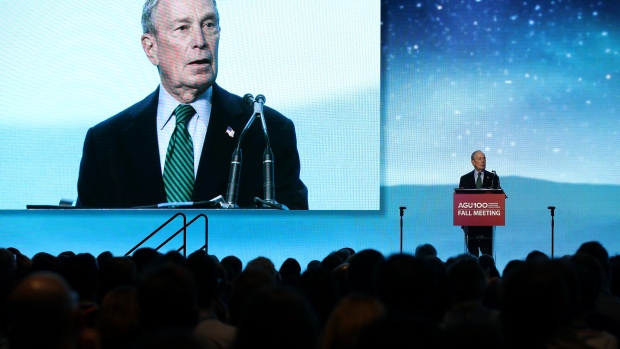(Bloomberg) -- Former New York Mayor Michael Bloomberg on Wednesday used his first presidential campaign visit to the make-or-break state of California to offer his plan to address the problems of poverty and housing affordability plaguing the Golden State.
Bloomberg is skipping the four initial nominating contests in February and focusing on California, Texas, North Carolina and the other delegate-rich states voting March 3 on Super Tuesday and beyond. California alone offers 495 delegates to the nominating convention next summer, a little over 10% of the total.
California is struggling with a housing affordability crisis that is fueling homelessness. Bloomberg released a proposal in Stockton to expand the Low-Income Housing Tax Credit, a public-private partnership that pairs federal funding with private investment, which he says could add hundreds of thousands of units over 10 years. He would also expand the Earned Income Tax Credit, increase the child tax credit and raise the minimum wage to $15 an hour by 2025.
“As president my job will be to move all America ahead, and that includes committing our country to new and innovative ways to combat poverty,” Bloomberg said in Stockton, a city about 80 miles east of San Francisco where he accepted the endorsement of Mayor Michael Tubbs.
Bloomberg is the founder and majority owner of Bloomberg LP, the parent company of Bloomberg News.
By proposing an expansion of the Low-Income Housing Tax Credit, Bloomberg appears to be adopting a program that has helped create affordable housing and enjoys bipartisan support. He’s also proposing a $10 billion competition to reward municipalities for opening up the most desirable neighborhoods to affordable housing and nationalize homeless programs he championed in New York.
He would also increase funding for federal housing assistance, but didn’t specify by how much.
The Low-Income Housing Tax Credit has financed more than 3 million apartments, according to the National Multifamily Housing Council, an apartment industry trade group.
Bloomberg didn’t put a price tag to taxpayers on his housing and poverty program at his appearance in Stockton, nor describe how it would be funded. The campaign later said it didn’t have an estimated cost of the proposals yet.
The median house price in California is above $600,000 -- more than twice the national level -- and the state has four of the country’s five most expensive residential markets. McKinsey & Co. estimated in 2016 that California needed 3.5 million more homes by the middle of next decade — a figure that the new Democratic governor, Gavin Newsom, has made a central part of his administration’s goals.
Other Democratic candidates including Elizabeth Warren, Bernie Sanders and Pete Buttigieg have also emphasized the need for more affordable housing, including supporting measures that would remove barriers to more dense development and advocating for more spending to build affordable new homes.
While Bloomberg’s rivals are focused on the early voting states, he will be campaigning in the states voting in March and April, when the majority of delegates needed for the nomination will be decided.
Still, some Democratic strategists are skeptical such an approach can overcome the momentum that the winners of the early state contests generate.
A survey released Dec. 5 by the Institute of Governmental Studies at the University of California Berkeley found that Bloomberg had 8% support among California voters. He also had the lowest favorability rating in the state of all the leading candidates among likely Democratic voters at 15%, with 40% saying unfavorable and 45% having no opinion. The poll was taken Nov. 21-27, just as Bloomberg entered the race Nov. 24.
In Stockton, Bloomberg again apologized for the stop-and-frisk anti-crime measure he used as mayor of New York. But on Wednesday he added that he supported those measures because “people want results.”
“It turned out we could have done something different, but people want results,” Bloomberg said. “I don’t think there’s anybody in California that doesn’t think the objective of bringing down the murder rate – particularly in poor communities – isn’t a good idea.”
--With assistance from Noah Buhayar.
To contact the reporters on this story: Mark Niquette in Columbus at mniquette@bloomberg.net;Jeffrey Taylor in San Francisco at jtaylor48@bloomberg.net
To contact the editor responsible for this story: Wendy Benjaminson at wbenjaminson@bloomberg.net
©2019 Bloomberg L.P.







